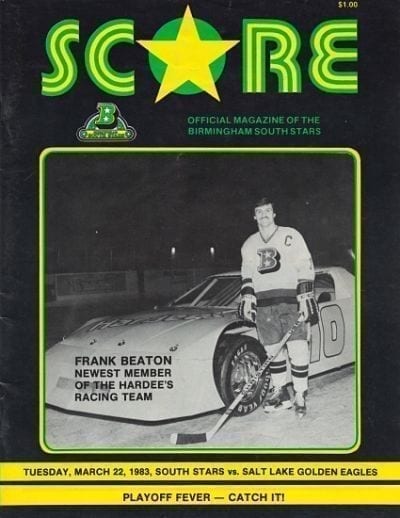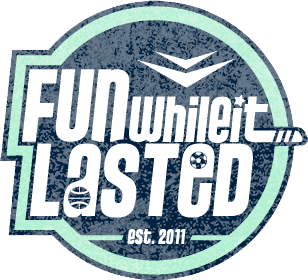Central Hockey League (1982-1983)
Tombstone
Born: Summer 1982
Re-Branded: July 1983 (Birmingham Bulls)
First Game: October 8, 1982 (L 6-1 vs. Indianapolis Checkers)
Last Game: May 4, 1983 (L 7-2 vs. Indianapolis Checkers)
Adams Cup Championships: None
Arena
Birmingham-Jefferson Civic Center
Opened: 1976
Marketing
Team Colors:
Ownership & Affiliation
Owners: Dr. Thomas Tucker II, Brent Hughes & Phil Roberto
NHL Affiliation: Minnesota North Stars
Background
The doomed Birmingham South Stars were the third attempt to establish pro hockey at Alabama’s 16,000-seat Birmingham-Jefferson Civic Center, opened in 1976. The South Stars of the Central Hockey League (CHL) followed the original Birmingham Bulls (1976-1979) of the major World Hockey Association and a later minor league edition of the Bulls that played in the CHL from 1979 to 1981. The minor league Bulls left a notably bad taste in the mouths of the local community, folding halfway through 1980-81 CHL season.
Nevertheless, the CHL was willing to take another chance on Birmingham and awarded a franchise to Southern Pro Hockey, Ltd. during the summer of 1982. The chairman of Southern Pro Hockey, Ltd. was Tommy Tucker, one of only abortion doctors serving the conservative states of Alabama and Mississippi. Tucker’s partners included former WHA-era Bulls players Brent Hughes and Phil Roberto.
The group secured a parent club affiliation with the NHL’s Minnesota North Stars. The North Stars sponsored the CHL’s Nashville South Stars during the 1981-82 season. But South Stars owner Larry Schmittou grew disillusioned with the wobbly CHL and left the league after just one season. Birmingham took over Nashville spot and retained both the South Stars name and marks, and Nashville’s former head coach Gene Ubriaco.
Adams Cup Run
The South Stars were troubled all season long in Birmingham. Attendance languished at less than 2,000 per game in the cavernous Civic Center. In February 20th, 1983, an Alabama tax official showed up at the Civic Center threatening to cancel the evening’s game unless the South Stars came up with several grand in unpaid sales taxes. Somehow the cash-strapped team came up with the dough.
But meanwhile, the South Stars were pretty damned good on the ice. Under Ubriaco’s direction, Birmingham finished third in the six-team CHL with a 41-37-2 record. Wes Jarvis led the league in scoring with 108 points on 40 goals and 68 assists.
The South Stars advanced to the CHL’s Adams Cup final series against the Indianapolis Checkers, top farm club of the Stanley Cup champion New York Islanders. This despite a walk-out threat from their players over the insolvent team’s plans to travel by bus rather than airplane from Alabama to Indiana for away games during the finals. Eventually the players agreed to play and they took the Checkers to the limit before falling in the deciding Game 7 on May 4, 1983.
The End
After the Adams Cup finals wrapped up in May, the South Stars fell to Earth rapidly. The Minnesota North Stars dropped the team as its farm club in June. In July of 1983, the CHL announced Birmingham would not be included on the league’s 1983-84 schedule.
South Stars ownership attempted to enter the franchise in the lower-budget Atlantic Coast Hockey League for the 1983-84 season instead. The team planned to take back the old Bulls name and logo for ACHL play. But the owners proved to be out of money and never managed to put up the necessary franchise fee or arena deposit. The ACHL terminated the Bulls franchise in October 1983 just five games into the season.
Trivia
Center Warren Young, the South Stars’ second leading scorer, notched 40 goals as a 28-year old rookie for the Pittsburgh Penguins during the 1984-85 NHL season.
Birmingham South Stars Shop
Links
###



One Response
The league’s commissioner, “Bud Poile,” was a TERRIBLE and pathetic one. The CHL was doomed by his “leadership” which allowed member teams to be scattered thousands of miles apart, making it impossible to utilize buses between teams locations. The costs of team’s air travel and lodging were ridiculous for a minor league! Imagine the team costs for 20 or so persons traveling from Salt Lake City to Indianapolis to Wichita to Denver to Birmingham to Tulsa! And the next season, the league’s final season, Poile “pushed through” approval for a team in Billings, Montana, to be admitted into the league. These were cities that were exceptionally expensive to reach, even for just one person! The league was successfully reincarnated/resurrected in 1992 as strictly a bus league, but down to a class AA development hockey league.